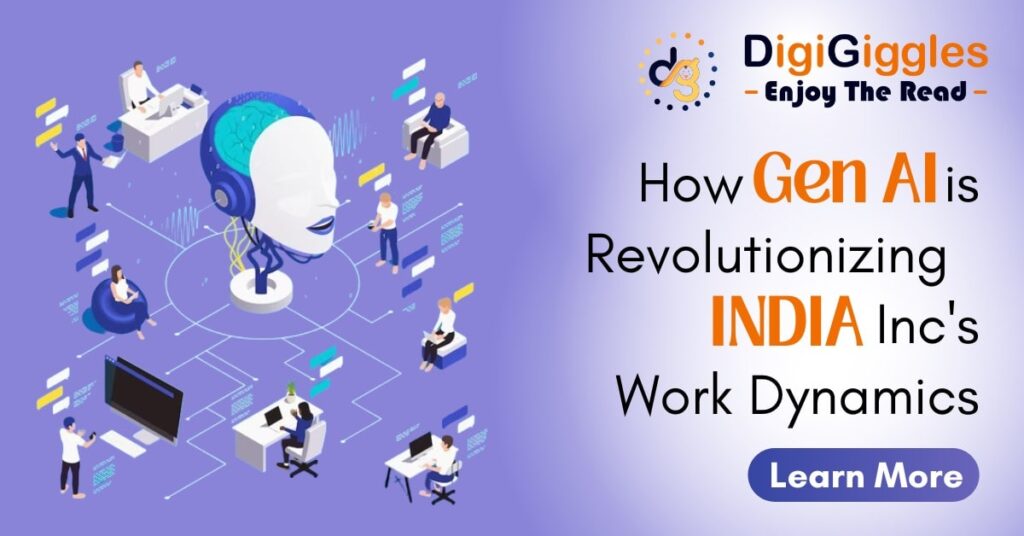
In the vast landscape of India Inc, a silent revolution is transpiring, and its name is Gen AI. Imagine a convergence of cutting-edge technology and the intricate dance of work dynamics. Gen AI isn’t just a buzzword; it’s a transformative force that’s reshaping the very DNA of how businesses operate. In this journey through the realm of technology and work, we’ll unravel the layers of this revolution, exploring the impact, the innovations, and maybe even a touch of humor along the way.
In the bustling world of Indian business, a new revolution is quietly taking place, driven by the transformative power of generative AI. This cutting-edge technology is not just about replacing human workers; it’s about augmenting their capabilities, unlocking new possibilities, and redefining the very nature of work itself. The traditional one-size-fits-all approach to workforce management has long been a stumbling block.
The Rise of Gen AI
Gen AI, or Generative Artificial Intelligence, marks the pinnacle of technological evolution. It’s not just about automating tasks; it’s about creating, optimizing, and revolutionizing the entire spectrum of work dynamics. From automating routine processes to crafting bespoke solutions, Gen AI is the wizard behind the curtain, orchestrating a symphony of efficiency. Imagine an enterprise where mundane tasks like sifting through resumes, scheduling interviews, and assessing candidates are seamlessly automated. Gen AI steps in as the tech virtuoso, parsing resumes with the precision of a surgeon, orchestrating interviews effortlessly, and assessing candidates beyond the constraints of human biases.
Gen AI and Opportunity
The question isn’t whether Gen AI is a game-changer; it’s how fast businesses can jump on the bandwagon. The data sings a compelling tune: over 60 percent of companies in the global south have already embraced AI for at least one business function. In India alone, a cohesive strategy integrating AI and data utilization could add a whopping $500 billion to its GDP by 2025. The stakes are high, and so is the cost of delay. From automating mundane tasks to generating creative content, generative AI is poised to reshape the Indian corporate landscape, making businesses more efficient, innovative, and customer-centric.
Let’s delve into how this AI revolution is transforming work dynamics across various industries:
- Banking and Finance (Reimagining Customer Experiences):
In the highly competitive banking and finance sector, generative AI is enabling institutions to personalize customer interactions, enhance risk management, and optimize financial processes. AI-powered chatbots are providing 24/7 customer support, offering personalized financial advice, and streamlining transactions. Additionally, AI algorithms are analyzing vast amounts of data to identify patterns, predict market trends, and mitigate financial risks.
- Healthcare (From Diagnosis to Treatment):
The healthcare sector is witnessing a paradigm shift with the integration of generative AI. AI-powered diagnostic tools are assisting doctors in making more accurate and timely diagnosis, while AI-driven drug discovery platforms are accelerating the development of new therapies. Moreover, AI algorithms are analyzing patient data to personalize treatment plans, improve patient outcomes, and reduce healthcare costs.
- Manufacturing (Precision and Efficiency):
Generative AI is transforming the manufacturing industry by optimizing production processes, enhancing quality control, and automating complex tasks. AI-powered predictive maintenance systems are identifying potential equipment failures before they occur, reducing downtime and improving operational efficiency. Additionally, AI algorithms are optimizing supply chains, reducing waste, and ensuring just-in-time delivery of materials.
- Retail (Hyper-Personalization and Customer Engagement):
The retail industry is embracing generative AI to personalize marketing campaigns, enhance customer engagement, and optimize product recommendations. AI-powered recommendation engines are suggesting products based on individual customer preferences, while AI-generated content is creating personalized marketing messages and engaging customer experiences.
- Education (Tailored Learning and Adaptive Teaching):
The education sector is undergoing a transformation with the integration of generative AI. AI-powered adaptive learning platforms are tailoring educational content to individual student needs and learning styles, providing personalized feedback, and identifying areas for improvement. Additionally, AI-driven chatbots are offering real-time support to students, answering questions, and providing guidance.
Strategic Optimization with Precision
While automation brings efficiency, optimization takes the performance to the next level. Gen AI navigates the challenges that automation alone can’t address. In the realm of interviews and assessments, for instance, scheduling, language barriers, and human biases can introduce inefficiencies. Enter Large Language and GPT Models, the celestial maestros of optimization. These models seamlessly integrate with communication platforms, sending customized tests to applicants, recording responses, and grading them objectively. The result? A streamlined interview and assessment process, free from the constraints of time and language. It’s like having a cosmic choreographer orchestrating a flawless performance, eliminating inefficiencies and ensuring every move is in perfect harmony.
Crafting the Cosmic Work Experience
The final act in this cosmic ballet is generation. Gen AI models like GPT and DALLE-3 are the stars of this show. They don’t just optimize existing processes; they create entirely new dimensions of work experience. These models analyze workforce productivity data at an individual level, identifying pain points and crafting tailored solutions. Consider the monumental task of upskilling. Traditionally, this has been a labor-intensive process for HR teams. Enter DALLE-3 models, ready to create customized video skilling courses with a few prompts.
Conclusion
Generative AI is not a threat to human jobs; it’s an opportunity to redefine what work means. As AI takes over repetitive tasks, human workers will be freed up to focus on more creative, strategic, and meaningful aspects of their jobs. This shift will require upskilling and reskilling initiatives, ensuring that the workforce is equipped to collaborate with AI and thrive in the new era of work. India Inc. is at the forefront of this AI-powered transformation, embracing generative AI to enhance productivity, improve customer experiences, and drive innovation. As AI continues to evolve, the future of work in India will be characterized by collaboration, creativity, and the seamless integration of human and machine intelligence.